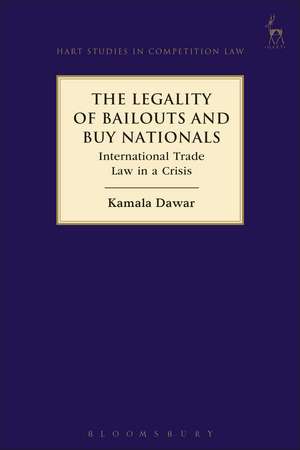The Legality of Bailouts and Buy Nationals: International Trade Law in a Crisis: Hart Studies in Competition Law
Autor Kamala Dawaren Limba Engleză Paperback – 22 ian 2020
| Toate formatele și edițiile | Preț | Express |
|---|---|---|
| Paperback (1) | 238.22 lei 6-8 săpt. | |
| Bloomsbury Publishing – 22 ian 2020 | 238.22 lei 6-8 săpt. | |
| Hardback (1) | 511.48 lei 6-8 săpt. | |
| Bloomsbury Publishing – 20 sep 2017 | 511.48 lei 6-8 săpt. |
Din seria Hart Studies in Competition Law
- 30%
 Preț: 956.51 lei
Preț: 956.51 lei - 21%
 Preț: 275.26 lei
Preț: 275.26 lei - 18%
 Preț: 313.74 lei
Preț: 313.74 lei - 18%
 Preț: 313.07 lei
Preț: 313.07 lei -
 Preț: 315.54 lei
Preț: 315.54 lei - 22%
 Preț: 270.75 lei
Preț: 270.75 lei - 30%
 Preț: 540.54 lei
Preț: 540.54 lei - 27%
 Preț: 777.24 lei
Preț: 777.24 lei - 14%
 Preț: 893.15 lei
Preț: 893.15 lei - 30%
 Preț: 539.18 lei
Preț: 539.18 lei - 21%
 Preț: 217.35 lei
Preț: 217.35 lei -
 Preț: 365.91 lei
Preț: 365.91 lei - 30%
 Preț: 779.09 lei
Preț: 779.09 lei - 18%
 Preț: 313.46 lei
Preț: 313.46 lei - 22%
 Preț: 261.17 lei
Preț: 261.17 lei - 23%
 Preț: 255.76 lei
Preț: 255.76 lei - 18%
 Preț: 299.96 lei
Preț: 299.96 lei - 21%
 Preț: 235.29 lei
Preț: 235.29 lei - 22%
 Preț: 250.09 lei
Preț: 250.09 lei - 18%
 Preț: 322.05 lei
Preț: 322.05 lei - 30%
 Preț: 894.38 lei
Preț: 894.38 lei - 22%
 Preț: 780.23 lei
Preț: 780.23 lei - 30%
 Preț: 539.57 lei
Preț: 539.57 lei - 24%
 Preț: 189.80 lei
Preț: 189.80 lei - 30%
 Preț: 837.39 lei
Preț: 837.39 lei -
 Preț: 319.13 lei
Preț: 319.13 lei - 22%
 Preț: 251.65 lei
Preț: 251.65 lei - 30%
 Preț: 569.22 lei
Preț: 569.22 lei - 30%
 Preț: 961.39 lei
Preț: 961.39 lei - 27%
 Preț: 1136.75 lei
Preț: 1136.75 lei
Preț: 238.22 lei
Preț vechi: 305.99 lei
-22% Nou
Puncte Express: 357
Preț estimativ în valută:
45.59€ • 47.42$ • 37.64£
45.59€ • 47.42$ • 37.64£
Carte tipărită la comandă
Livrare economică 14-28 aprilie
Preluare comenzi: 021 569.72.76
Specificații
ISBN-13: 9781509935130
ISBN-10: 1509935134
Pagini: 272
Dimensiuni: 153 x 234 mm
Greutate: 0.39 kg
Editura: Bloomsbury Publishing
Colecția Hart Publishing
Seria Hart Studies in Competition Law
Locul publicării:London, United Kingdom
ISBN-10: 1509935134
Pagini: 272
Dimensiuni: 153 x 234 mm
Greutate: 0.39 kg
Editura: Bloomsbury Publishing
Colecția Hart Publishing
Seria Hart Studies in Competition Law
Locul publicării:London, United Kingdom
Caracteristici
The author offers valuable insights into the impact of the economic crisis on procurement and into what lessons might be learned
Notă biografică
Kamala Dawar is Senior Lecturer in Law at the University of Sussex.
Cuprins
1. Introduction I. Overview II. Promoting Competition III. Government Procurement Law and Policy IV. Integrating Competition and Government Procurement Laws V. Private Anti-Competitive Behaviour VI. Assessing the Legality of the Crisis Measures in Six Case Study Countries VII. The Enforcement of International Trade Law in a CrisisVIII. The Outline of the Book Part I: The Rules Governing Bailouts and Buy-Nationals2. The International Framework I. Introduction II. Competition Policy and Non-Discrimination under the GATT III. Competition and Public Procurement under the GATT IV. GATT Article I:1 Most Favoured Nation and Government ProcurementV. Buy-Nationals under the Agreement on Subsidies and Countervailing Measures VI. Competition Policy under the GATS: Bailouts and Buy-Nationals VII. The WTO Government Procurement Agreement and Competition VIII. Conclusions 3. The Regional Rules I. Overview II. Selecting the RTAs for Assessment III. The USA's RTAs IV. Brazil's RTAs V. India's RTAs VI. The EU's RTAs VII. TFEU State Aid Rules under WTO Commitments VIII. Conclusions 4. Characterising the Rules I. Introduction II. Assessing the Provisions III. The Nature of Legal Obligations A. Bilateral and Collective Obligations IV. The Nature of Selected WTO Obligations V. WTO GPA Provisions VI. WTO ASCM Provisions VII. Characterising the Selected RTA Provisions VIII. The TFEU and the Role of the European Commission IX. Summary Conclusions Part II: The Case Studies International Trade Law in a Crisis: Who Makes it and Who Breaks it?5. Assessing the Legality of Bailouts and Buy-Nationals I. US Fiscal Bailout Measures II. Brazil's Bailout Measures in the Financial Sector III. The Legality of India's Bailouts and Buy-Nationals IV. Regulating Crisis Bailouts under the TFEU V. Member State Bailouts in the Financial Sector VI. The UK Financial Sector Bailouts under the TFEU VII. The Financial Bailout Measures in Germany VIII. The Legality of the Rescue Measures under the TFEU IX. The Interface between EU State Aid Control and the ASCM Part III: Enforcing International Trade Law in a Crisis6. Challenging Bailouts and Buy National Measures I. Overview II. WTO Consultations and the Dispute Settlement Body III. WTO Trade Remedies 2008-13 IV. Regional Regulatory Responses to the Crisis 7. From the Wealth to the Stealth of Nations I. Overview II. Increasing Compliance During Crises: The Case for Collective Enforcement III. The Institution of the WTO IV. Hodie tibi, cras mihi? V. To the Health or the Stealth of Nations?
Recenzii
This book offers a well-argued and insightful critical assessment of the shortcomings of international trade and competition rules in tackling interventionist State measures in the context of an economic crisis. Dawar offers an evidence-rich account of the challenges that State protectionism creates for international trade liberalisation and for the protection of competition in international markets. Her insights will be particularly interesting in the context of current events leading to another surge of State economic interventionism, both for academics and for policy-makers with an interest in international trade.
"This book bursts the bubble of the self-congratulatory attitude that existing institutions, which were set up to discipline governments from a race to the bottom on economic policy, worked well after the financial crisis. These institutions may have prevented tariff wars, a big achievement compared to the time of the Great Depression. But they went along with the subsidies and state aid that governments put in place after 2007. Such flexibility on economic policy is essential in turbulent times. But these institutions are undermined if flexibility comes with a race to the bottom that shifts money away from policies for the more marginalized sections of society. At a time when the left behinds are changing the political landscape of the world, Kamala's book debunks the myth of the success of existing institutions in containing the economic fallout of the global financial crisis. It gives a sobering warning of what might unfold when institutions deal with economic challenges by turning a blind eye to their own rules for checking unfair competition."
'An impressive contribution to our understanding of the financial crisis. Dawar's reading of bailouts and buy national through the lens of competition law and government procurement law and policy is inspirational.'
'The diplomatic fiction that during the crisis years regional and global trade rules ensured a level commercial playing field is skewered by Dawar's trenchant legal analysis.'
"This book bursts the bubble of the self-congratulatory attitude that existing institutions, which were set up to discipline governments from a race to the bottom on economic policy, worked well after the financial crisis. These institutions may have prevented tariff wars, a big achievement compared to the time of the Great Depression. But they went along with the subsidies and state aid that governments put in place after 2007. Such flexibility on economic policy is essential in turbulent times. But these institutions are undermined if flexibility comes with a race to the bottom that shifts money away from policies for the more marginalized sections of society. At a time when the left behinds are changing the political landscape of the world, Kamala's book debunks the myth of the success of existing institutions in containing the economic fallout of the global financial crisis. It gives a sobering warning of what might unfold when institutions deal with economic challenges by turning a blind eye to their own rules for checking unfair competition."
'An impressive contribution to our understanding of the financial crisis. Dawar's reading of bailouts and buy national through the lens of competition law and government procurement law and policy is inspirational.'
'The diplomatic fiction that during the crisis years regional and global trade rules ensured a level commercial playing field is skewered by Dawar's trenchant legal analysis.'









